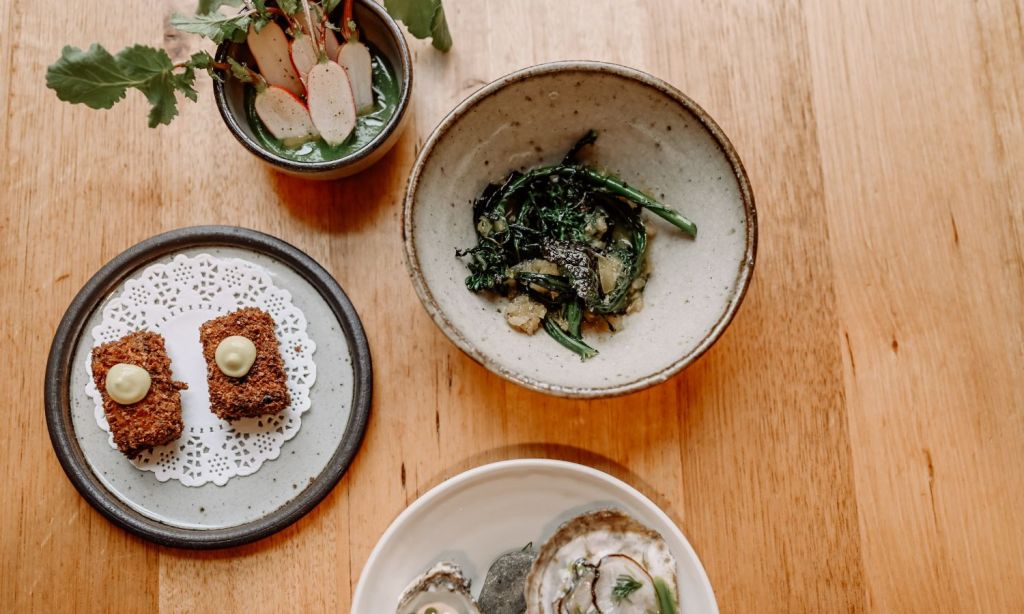While many restaurants in Australia boast about being farm-to-table, few can claim to grow all their fruits and veggies in a garden farm, steps from their kitchen. The Agrarian Kitchen in the suburb of New Norfolk, a 30-minute drive from Hobart, can. I recently visited it on a trip to Tasmania, organised by Booking.com. In 2021, the platform launched a sustainability badge for its eco-conscious properties.
The restaurant started as a cooking school and farm by co-founders Rodney Dunn and Severine Demanet in 2008 in their home in the Old Schoolhouse in Lachlan, Tasmania. The two wanted to encourage others to connect back with the earth and to grow and cook food with real ingredients.
In 2015, the pair were shown a beautiful building in Willow Court. Once the site of a mental asylum, its buildings had been freshly renovated and in need of tenants. Those tenants became Dunn and Demanet, and in 2017, the restaurant opened its doors.

“We were enchanted by its high, original pressed metal ceilings, the beautiful linoleum floors and the sheer vastness of the space,” says Dunn. “We had been running The Agrarian Kitchen for seven years, and we were ready to take on a new challenge. Besides, New Norfolk was in sore need of a dining destination.”
Today, in addition to being a restaurant, The Agrarian Kitchen holds one-hour garden farm tours ($30 for adults and $15 for kids) and cooking classes like ‘fermentation experience’, ‘handmade pasta’ and ‘gardening fundamentals’. Dine in its warehouse-like restaurant on a set lunch menu on Fridays, Saturdays and Sundays, adding on an alcoholic or non-alcoholic drinks pairing. Or grab a small bite at its kiosk out front that you can enjoy on the lawn or take somewhere nearby to eat.
“The dining experience at The Agrarian Kitchen is so inextricably linked to the garden and the surroundings that each week, the menu changes in some way to best utilise the produce from the garden and local suppliers,” says Dunn. “Up to 95% of what’s served on the plates in the dining room, kiosk and cooking school comes from our own garden.”

The restaurant’s cheese is made using local milk and its own starter culture. The kitchen also makes its own cured meats and preserves excess to be used at a later stage, often using koji to create umami-rich flavours from leftover vegetables, meats and seafood. Dunn says the team is committed to giving diners a truly local experience, one that can only be had at its venue and only on that day.
The garden by head gardener Mitch Thiessen is the result of Thiessen’s avid thirst for sustainable planting practices. He’s continued to refine his methods over the last three years. It incorporates regenerative agriculture philosophies and takes into consideration Japanese lean principles based on efficiency and reducing waste of time.
The garden is also no-till, which Dunn says was the vision from the start, though a shift from the previous garden in which the soil was till. He says it was becoming increasingly clear from a scientific point of view that not tilling brought a lot of benefits.

“Our aim was to create biologically rich soil with lots of ycorrhizal fungi,” he says. “Not tilling the soil would prevent destroying these delicate structures, which themselves not only give structure to the soil but also form symbiotic relationships with many vegetables, feeding required nutrients and in return being fed sugars by the plants.”
The other benefit of not tilling is that it keeps carbon locked in the soil and drastically reduces the amount of weeding. Instead, weed seeds stay buried and don’t germinate. The Agrarian Kitchen generates all its own fertility for the garden using kitchen waste that’s made into compost, fish hydrolysate and calcium tonic. It also turns its meat bones into biochar in a wood-fired oven. The bones are then crushed and missed through the compost.

“Our aim is to produce the healthiest, tastiest, most nutrient-rich vegetables possible, and we are not dogmatic about anything we do,” says Dunn. “It’s important to be able to adapt to information as we learn.”
Related: 10 of the Best Restaurants In Bondi, According to Someone Who Eats There Once a Week
Related: 10 Melbourne Restaurants Big Enough for the Group Chat’s Friendmas Dinner
Read more stories from The Latch and subscribe to our email newsletter.







